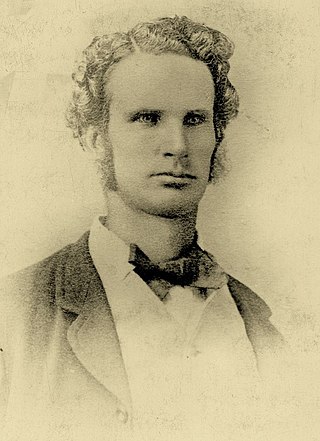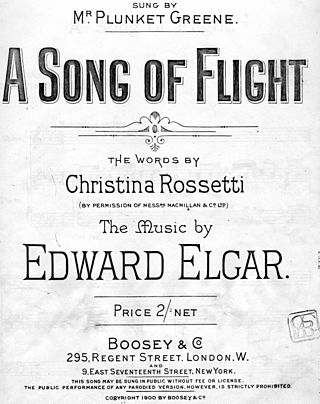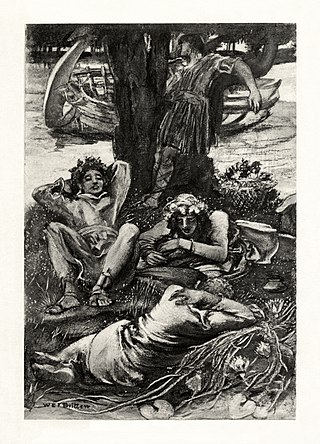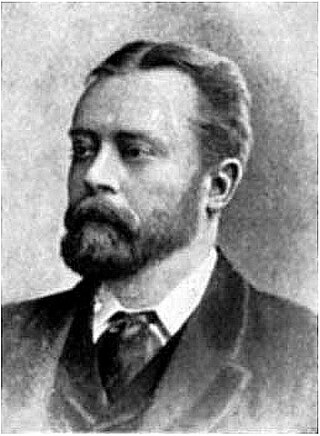Related Research Articles
"Land of Hope and Glory" is a British patriotic song, with music by Edward Elgar, written in 1901 and with lyrics by A. C. Benson later added in 1902.

Sara Teasdale was an American lyric poet. She was born Sarah Trevor Teasdale in St. Louis, Missouri, and used the name Sara Teasdale Filsinger after her marriage in 1914. In 1918, she won a Pulitzer Prize for her 1917 poetry collection Love Songs.
Sea Pictures, Op. 37 is a song cycle by Sir Edward Elgar consisting of five songs written by various poets. It was set for contralto and orchestra, though a distinct version for piano was often performed by Elgar. Many mezzo-sopranos have sung the piece.

"Darkness" is a poem written by Lord Byron in July 1816 on the theme of an apocalyptic end of the world which was published as part of the 1816 The Prisoner of Chillon collection.

"Sea Slumber Song" is a 19th-century poem by Roden Noel set to music by Sir Edward Elgar as the first song in his song-cycle Sea Pictures (1899).
"Sabbath Morning at Sea" is a poem by Elizabeth Barrett Browning first published in 1839, which Sir Edward Elgar set to music in 1899 as the third song in his song-cycle Sea Pictures.
Wee Sing is a songbook series published by Price Stern Sloan. It would also inspire a series of children's CDs, cassettes, coloring books, toys, videos, and apps.

Adam Lindsay Gordon was a British-Australian poet, horseman, police officer and politician. He was the first Australian poet to gain considerable recognition overseas, and according to his contemporary, writer Marcus Clarke, Gordon's work represented "the beginnings of a national school of Australian poetry".

Hodie is a cantata by Ralph Vaughan Williams. Composed between 1953 and 1954, it is the composer's last major choral-orchestral composition, and was premiered under his baton at Worcester Cathedral, as part of the Three Choirs Festival, on 8 September 1954. The piece is dedicated to Herbert Howells. The cantata, in 16 movements, is scored for chorus, boys' choir, organ and orchestra, and features tenor, baritone, and soprano soloists.
These are the films directed by the pioneering American filmmaker D. W. Griffith (1875–1948). According to IMDb, he directed 518 films between 1908 and 1931.
Lord Saltoun and Auchanachie, is a Scottish folk song.
"A Song of Autumn" is a poem by Adam Lindsay Gordon set to music by Edward Elgar in 1892.

"A Song of Flight" is a song written by the English composer Edward Elgar in 1895, as his Op. 31, No. 2, with the words from a poem by Christina Rossetti.
"A Child Asleep" is a song, with lyrics from a poem written by Elizabeth Barrett Browning. It was set to music by the English composer Edward Elgar in December 1909 and published in 1910 by Novello. It was first published by Browning in 1840.
Coronation Ode, Op. 44 is a work composed by Edward Elgar for soprano, alto, tenor and bass soloists, chorus and orchestra, with words by A. C. Benson.

The Lotos-Eaters is a poem by Alfred Tennyson, 1st Baron Tennyson, published in Tennyson's 1832 poetry collection. It was inspired by his trip to Spain with his close friend Arthur Hallam, where they visited the Pyrenees mountains. The poem describes a group of mariners who, upon eating the lotos, are put into an altered state and isolated from the outside world. The title and concept derives from the lotus-eaters in Greek mythology.

Edwin James Milliken, was a Punch editor, journalist, satirical humorist and poet. He is best known for his oft-quoted poem "Death and his brother sleep", notably quoted by Winston Churchill in the prelude to World War II when he felt that parliament was not taking the prospect of a war against Hitler seriously enough. He produced a series of comic poems published as The 'Arry Papers between 1874 and 1897. He worked as journalist on the London Figaro in 1872 and joined Punch in 1877. His creation of 'Arry, a bombastic Cockney, resulted in a successful series of poems which were hailed for their phonetic precision. Milliken described 'Arry as "really appalling. He is not a creature to be laughed at or with." In 1883 he published The Modern Ars Amandi.

"Ännchen von Tharau" is a 17-stanza poem by the East Prussian poet Simon Dach. The namesake of the poem is Anna Neander (1615–1689), the daughter of a parson from Tharau, East Prussia. The poem was written on the occasion of her marriage in 1636 and had been set to music as a song by 1642.
"The Kraken" is a sonnet by Alfred Tennyson (1809–1892) that describes the Kraken, a mythical creature. It was published in Tennyson's Poems, Chiefly Lyrical (1830).

Fifine at the Fair is a poem in Alexandrine couplets by Robert Browning, published in 1872.
References
- Sladen, Douglas. The Poems of Adam Lindsay Gordon, 1912, London, Constable & Co.